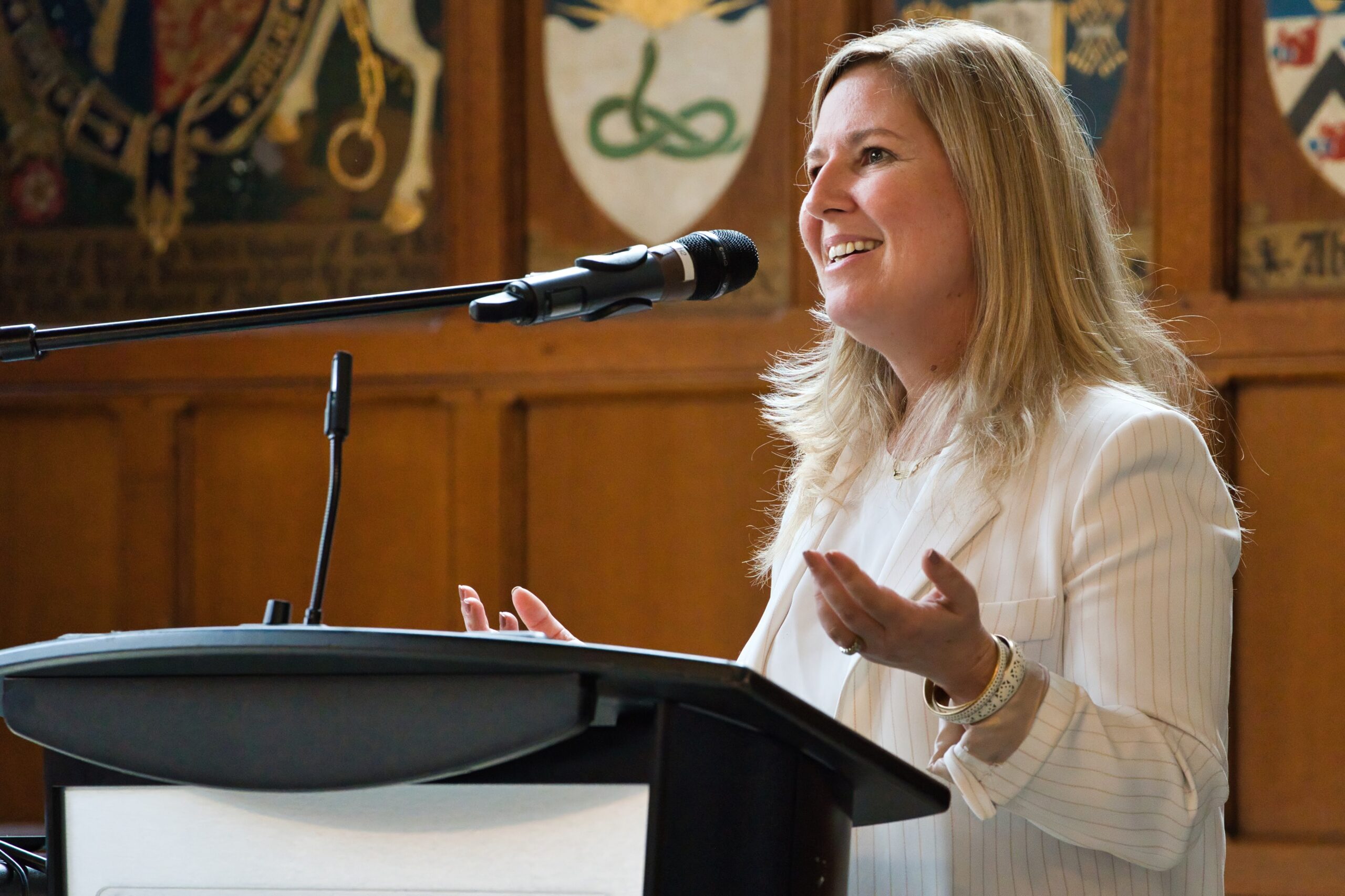Alumna invests in strengthening and expanding access to palliative and hospice care through student fellowships
Categories: Alumni + Friends, Awards & Recognition, Faculty, Programs + Teaching, Students, Susan BlackerInspired by the potential of palliative and hospice care to facilitate a dignified death for all, Factor-Inwentash Faculty of Social Work donor and alumna Kasia Seydegart (MSW 1973) invests in this evolving area of practice by supporting student fellowships
When Shuruthii Thiyagasoruban worked in a Toronto hospital intensive care unit during the COVID-19 crisis, she saw families struggling to navigate death and dying while separated because of the pandemic.
“One person passes away, but there are so many people who are affected by that,” she says. “Not being able to physically spend final moments with loved ones can be devastating.”
Her experience connecting patients with their families through virtual platforms, and being present at the bedside when relatives could not, prompted her to pursue training in palliative care as part of her Master’s in Social Work program. When her own grandmother died in 2021, her interest in palliative care became even more personal.
“My grandmother had aggressive care measures at the end of her life, and we know that’s not what she wanted,” she says, reflecting on the language barriers and misunderstandings around palliative care options her grandmother experienced — systemic issues common to racialized and immigrant communities.
Currently in the second year of her program, Thiyagasoruban is the recipient of the Seydegart-Spears Fellowships in Palliative Care for People who are Dying in hospice, in the home or on the street, an award created to spark new thinking and expand access to palliative and hospice care. In addition to course work in palliative care, Thiyagasoruban also had the opportunity to pursue a practicum at Providence Healthcare’s palliative unit.
 A highlight of life
A highlight of life
“Death can be a highlight of life, if it’s treated with respect and kindness,” says donor and FIFSW alumna Kasia Seydegart (MSW 1973), who established the student fellowships with her husband George Spears. “I hope these awards will stimulate thoughtful and creative approaches to palliative care, including for those people who are at the margins.”
After completing her FIFSW Master of Social Work, Seydegart began her career as an outpatient therapist at CAMH (then the Addiction Research Foundation), before moving into social policy research and launching ERIN Research. Committed to community impact, she helped launch East Wellington Community Services in Erin, Ontario. Following the deaths of her parents, Seydegart became involved in the establishment of Bethell Hospice in Caledon, Ontario. (Both her parents have University of Toronto student awards in their names — Stanislaw Seydegart Award in Healthy Aging and Life long Learning honouring her father, and the Janka Seydegart Scholarship in Feminist Studies, her mother.)
Seydegart has seen the difference palliative and hospice care can make. As a long-serving volunteer and former Chair of the Foundation Board at Bethell Hospice, she is inspired by the potential of death to be experienced as a significant milestone.
“Bethell Hospice enables people to die in a dignified, peaceful and as pain free as possible way, surrounded by their family and friends,” she says, contrasting the hospice experience with the challenges she and her sister faced when their parents died in hospital. With its comforting atmosphere, space for children and family members and holistic approach to palliative care — captured in the Bethell Hospice Story film, which Seydegart helped produce — the hospice is far from the fast pace and constant noise of a hospital environment.
Increasing access to palliative care
Recently, Seydegart had the opportunity to learn about Toronto’s Palliative Education and Care for the Homeless (PEACH) program and recognized the need to broaden access to palliative and hospice care to marginalized populations.
“Bethell is a place for people to die if they cannot die at home in a dignified, comfortable way. But what about people with no homes — people who are unhoused?” she says. “How do we become more inclusive?”
Seydegart sees social workers playing a key role in both palliative and hospice care, as well as in outreach to vulnerable individuals, including certain refugee and immigrant populations and unhoused people. And indeed, FIFSW graduates have gone on to work in both Bethell Hospice and the PEACH program.
 “Palliative and hospice care are growing areas of social work practice,” says clinical social worker, palliative care expert and FIFSW instructor Susan Blacker, who teaches the popular Social Work in Palliative Care course in the Master of Social Work program. She notes an increased awareness of the importance of palliative care and improved access to services, especially for those with diagnoses other than cancer.
“Palliative and hospice care are growing areas of social work practice,” says clinical social worker, palliative care expert and FIFSW instructor Susan Blacker, who teaches the popular Social Work in Palliative Care course in the Master of Social Work program. She notes an increased awareness of the importance of palliative care and improved access to services, especially for those with diagnoses other than cancer.
“Today’s model of care is focused on identifying palliative care needs earlier than in the past — even at the time of diagnosis of a serious illness,” says Blacker, who is also Senior Director, Cancer and Palliative Program Planning and Performance at Sinai Health System and Provincial Clinical Co-Lead for the Ontario Palliative Care Network (OPCN).
“Many patients will want to pursue all of the medical treatments that are possible, but at the same time they may also be worrying about the ‘what ifs?’ she says. “Others may be struggling with physical, psychosocial and practical problems that are impacting their quality of life and can be managed with the holistic approach that palliative care provides We need to start having those conversations earlier.”
Equipped with increasingly specialized skills and competencies in palliative care, social work graduates can be instrumental in helping ensure patients are well supported across different care settings, including serving communities with palliative care gaps, such as unhoused populations. This training is not only crucial for students in the faculty’s gerontology field of study — social workers may be supporting populations with life-limiting illnesses at all stages of life.
“The benefits of an interprofessional approach to palliative care can be so significant, especially when we can get involved earlier in someone’s journey,” says Blacker. “We can often decrease the chance of that person needing to come into a hospital or to come to the emergency department in a crisis.”
By working in partnership with patients and families to understand the impact of the illness on their family system, facilitate access to community resources, address caregiver needs, provide grief and bereavement support and much more, social workers play a key role on the palliative care team.
Investing in the future of palliative care
“It is such a rich and unique area for social work practice, and we have so much opportunity to make an impact,” says Blacker. “I’m inspired to be training the next generation of leaders who will not only be caring for clients, but also developing new programs and approaches to providing care.”
Seydegart established the student fellowships with this same goal — by supporting future leaders in the field such as Thiyagasoruban, who hopes to improve understanding of palliative care among the South Asian diaspora and help more people benefit from it.
“Hospice and palliative care is not finished, we keep learning,” says Seydegart. “I hope the awards help stimulate thinking and action around this, because this type of care must keep growing and becoming wiser and broader, more inclusive.”
By Carolyn Morris

